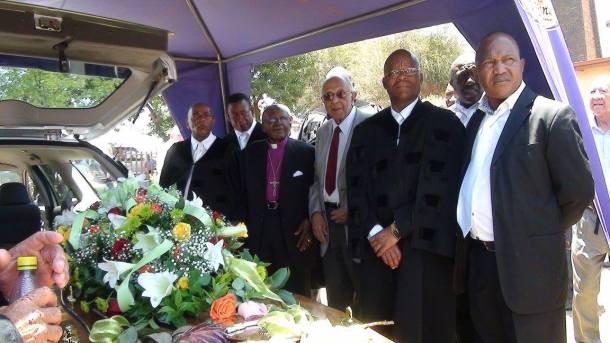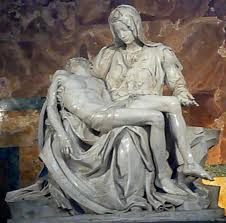My dear friend Gerrie Lubbe died recently. He was given a hero’s funeral service at his church in South Africa. Gerrie played a brave and important role in the freedom struggle there, and was the first president of the South African Chapter of the World Conference on Religion and Peace. Archbishop Desmond Tutu, with whom he worked closely, was present yesterday to see Gerrie off. But where to? What do Christians believe about death?
Christmas draws our attention to the fact of death. Indeed, T.S. Elliot called Christmas “this birth season of decease”. For, as he put it, through the medium of the Magi:
“There was a Birth, certainly
We had evidence and no doubt.”
Yet the birth narratives of Luke and Matthew are shot through with references, not just to new life, the birth of a baby, but to death. For example, the ancient Simeon, when he recognizes the infant as the fulfilment of God’s promises, asks for his own death:
“Lord, now lettest thou thy servant depart in peace,
according to thy word;
for mine eyes have seen thy salvation…”
But Simeon promised Mary, not peace but agony: “a sword will pierce through your own soul also”. Prescient words: John records how, thirty years or so later, Mary was at the foot of the cross, on which her son was hanging and dying.
Too many people make religion either exclusive and bad-tempered, or else cloying and sentimental. Death is what some nasty religious people think is what should happen to those who believe and act differently from them. Or else it’s what mawkish religious people hope is a chance to enter an existence where things simply get better: “You’ll get pie in the sky when you die”, as Joe Hill’s 1911 parody of the hymn “In the sweet By- and By” has it.
No wonder Karl Marx and Sigmund Freud thought, in rather different ways, that religion offered an illusory vision of a heavenly reality that sensible and reasonable people should reject. However, their beliefs somewhat misunderstand the Jewish roots from which they sprang. For most of the Old Testament period, Jews had no positive convictions about a warm and fuzzy hereafter. As the psalmist put it: “I believe that I shall see the goodness of the Lord in the land of the living!” (Psalm 27:13). Even more bluntly, the author of Ecclesiastes wrote that:
“whoever is joined with all the living has hope, for a living dog is better than a dead lion. The living know that they will die, but the dead know nothing; they have no more reward, and even the memory of them is lost. Their love and their hate and their envy have already perished; never again will they have any share in all that happens under the sun” (9: 4-5)
Religion is mostly at its best when it’s forthright and challenging.
There’s no space here to frame a coherent Christian understanding of death. I doubt that there is one, anyway; only an impressionistic, elusive poetic sense that there may be more to life than meets the eye.
I offer two brief, elusive impressions.
First: our knowledge that we will certainly die should make us think hard about what we want to make of the gift of life. Some find the author of Ecclesiastes grim and hopeless and so, to a point, he is. But only to a point. Mostly, he challenges us to make the most of this life. For a summary of how to, I find John Wesley helpful: “Do all the good you can. By all the means you can. In all the ways you can. In all the places you can. At all the times you can. To all the people you can. As long as ever you can.”
My second impression: as all aging people do, I occasionally think of death as the closure to life and wonder, “Is that it?”, partly in the sense of whether something comes after, but mostly to ponder the desolate thought that I may not have taken full advantage of the gift of life. I may have been an unprofitable servant. At such times, it’s not to scientists and religious theologians to whom I mostly turn to elucidate so great a mystery, but to poets and mystics. I’m happy, for example, to sing wonderful doggerel like:
“When I tread the verge of Jordan,
Bid my anxious fears subside;
Death of deaths, and hell’s destruction,
Land me safe on Canaan’s side.
Songs of praises, songs of praises,
I will ever give to Thee;
I will ever give to Thee.”
I’m even happier to ponder the words of the extraordinary Jalāl ad-Dīn Muhammad Rūmī (1207-73). Today, I read them and think of Gerrie, and am thankful for all he was and hopeful for all that might yet be:
“Knock, And He’ll open the door
Vanish, And He’ll make you shine like the sun
Fall, And He’ll raise you to the heavens
Become nothing, And He’ll turn you into everything”
Perceptive and illuminating as all your blogs, Martin!
Helpful too ! Perhaps death is the last great adventure – an odyssey from which there is no return but, in faith, and arrival
Speakers from the pulpit have often propounded that our existence (births, lives and ends) on earth are a mere journey in preparation for eternal life awaiting in heaven, belittling the opportunity bestowed on us in our lifetime to live full Christian lives thereby immensely contributing to mankind….
As i am treading ” the verge of Jordan” at the age of nearly 93 , I sometimes think about my
purpose here: what have I actually ever done, except react to whatever happened to me?
What I probably tried to do is what John Wesley suggests we should do, although I got
to know about that great man only late in my life, and was certainly not acting on his advice.
What I do know, and am thankful for, is that in spite of the sometimes difficult, and even
tragic incidents, l have been the fortunate recipient of so much love and affection from my
family and friends, that I can only hope to have been worthy of it, and that I have been able to return it in some measure.
As for the reset as the French say: il n’ y a que let silence.
Another invigorating and thoughtful blog on the age old discussion of death and the hereafter. I found the line from Rumi:(….Become nothing, And He’ll turn you into everything” helpful in understanding the relationship with God in Life. That is what I would yearn for.